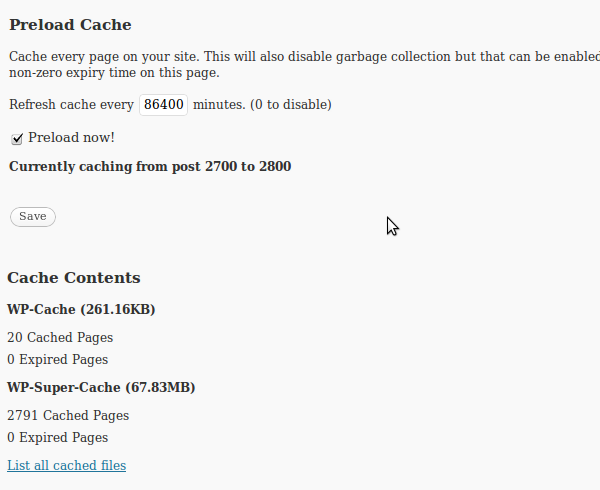Here’s a quick post to encourage brave testers. I’m adding object cache support to WP Super Cache so you’ll be able to store your cached files in a memcached backend instead of disk.
It’s not complete but it’s running on this blog and well, you’re reading this which means it’s doing something and not breaking! If you want to give it a go grab the development version from the download page.
There are few caveats, but three spring to mind:
- It won’t cache anything for “known” users. That is users who are logged in or leave comments. Usually a tiny minority of the visitors to any site.
- Refreshing of the cache is very incomplete. If you leave a comment, the cache for that page may not update immediately. The cache lifetime is set to 30 seconds, and after you leave a comment you become a “known user” and see the uncached version of the page anyway.
- When posts are updated the whole cache is invalidated.
If you don’t know what memcached is, or how to set it up then you probably don’t want to test this. If you do, use Google and find out about them. Unfortunately I don’t have time to explain how to install it.
Inspiration and some code taken from batcache, the excellent caching plugin we use on WordPress.com.
Update! I updated the Changelog in the readme.txt and I’m looking for testers. Here’s what’s new in the development version:
* Added experimental object cache support.
* Added Chinese(Traditional) translation by Pseric.
* Added FAQ on WP-Cache vs Supercache files.
* Use Supercache file if WP-Cache file not found. Useful if mod_rewrite rules are broken or not working.
* Get mobile browser list from WP Mobile Edition if found. Warn user if .htaccess out of date.
* Make sure writer lock is unlocked after writing cache files.
* Added link to developer docs in readme.
* Added Ukranian translation by Vitaly Mylo.
* Added Upgrade Notice section to readme.
* Warn if zlib compression in PHP is enabled.
* Added compression troubleshooting answer. Props Vladimir (http://blog.sjinks.pro/)
* Added Japanese translation by Tai (http://tekapo.com/)
* Updated Italian translation.
The biggest changes are the addition of the object cache and a small change to the php code that serves cached wp-cache files. If the mod_rewrite rules on your site don’t work for whatever reason the plugin will look for the Supercache file and serve that instead. An extra header is added to the served page when this happens. It’s all in the readme.txt!



